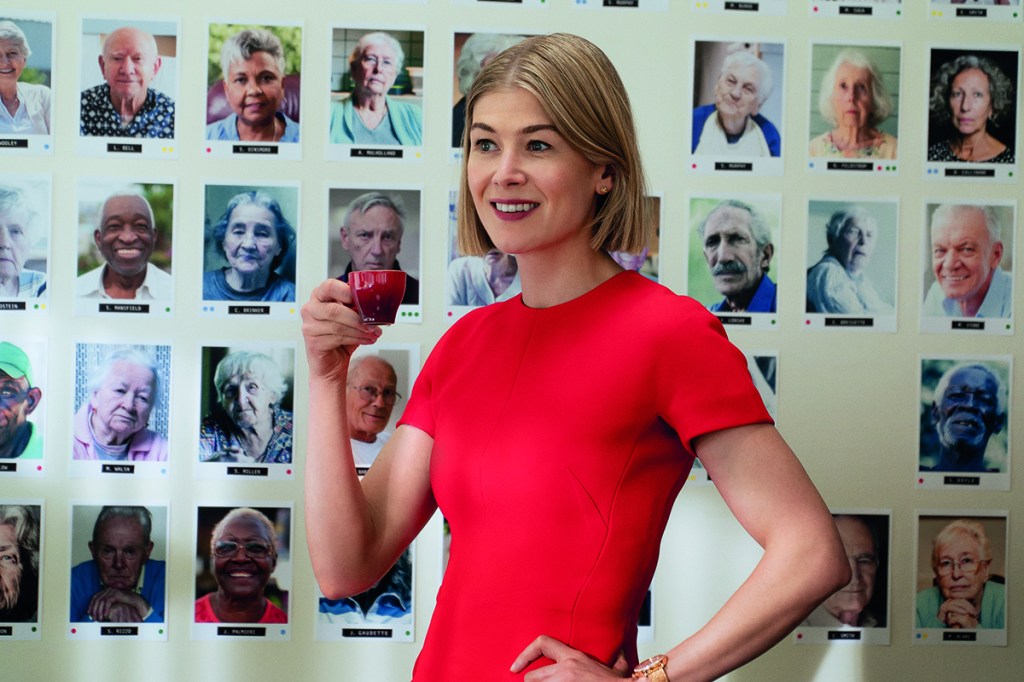The poster for I Care a Lot, now available on Netflix and Amazon Prime, has a pull quote from a Collider review: ‘DELICIOUSLY NASTY’. In a better world, perhaps this would be true. But here on Earth, we have J Blakeson’s film, starring Rosamund Pike as Marla Grayson, a predatory professional legal guardian convincing crooked courts to grant her the right to put old people in nursing homes against their will, regardless of their health or mental capacity. This allows her to cash in on their homes, jewelry, valuables and anything else that she can vacuum up.
Near the beginning of the film, shortly before she picks up ‘a cherry’ in the form of Jennifer Peterson (Dianne Wiest), we see Marla before a wall of her wards, all taped up and looking miserable in their intake headshots. They’ve been locked away in nursing homes across America, where so many people suffer and die alone. Pike plays Marla with steely verve, recalling Sharon Stone in Basic Instinct, without any erotic mind games. Marla is a sociopath, beyond ‘cold’. Pike never lets up, and is tuned as tight as an E-string throughout. Wiest is compelling as always, and the supporting players Nicholas Logan, Chris Messina, Damian Young and Alicia Witt do good work too.
But I Care a Lot is a miserable film — not as misguided as Emerald Fennell’s Promising Young Woman, but similarly tone deaf and reactionary. Why are all of the bad guys Russian? Peter Dinklage plays the heavy, a thug named Roman Lunyov who’s in cahoots with Peterson, who’s herself a con woman living under a false identity. Peterson is no ‘cherry’: as soon as Marla puts her in a home, the Russian mob and its attendants descend upon her and her partner Fran (Eiza González).
It’s true that Marla Grayson is closer to the protagonists of American Psycho and The Wolf of Wall Street than any femme fatale, but she is still defined by her insistence on following the rules: everything Marla does is technically legal, even if a number of other people are clearly in on the take. She’s the ‘girl boss’ taken to her logical extreme: an uncaring battle-ax, but one with a plan. She’s done her homework, and is just as qualified as the next loan shark or ambulance chaser. Yes, fearless girl, you too can one day rob the elderly of their money and their autonomy — all it takes is a crisp pantsuit and hours working twice, thrice, five times as hard as the next most qualified man.
González told the Observer that she enjoyed the ‘refreshing appeal of playing women that are devoid of shame’, and her character certainly is devoid of it. Fran and Marla’s relationship is one of the only aspects of the movie that’s handled properly: without mention. But this is still a #MeToo movie, a Trump-era movie. The title itself reads as a belated response to Melania Trump’s ‘I REALLY DON’T CARE. DO U?’ jacket. First Lady Jill Biden recently made her own more obvious riposte with a jacket with a back reading simply, ‘LOVE’. I’m sorry to say that both responses fall flat against the brazen provocation of Mrs Trump’s 2018 original.
Marla may be ruthless, even evil, but Pike always retains her particular pose of professionalism. Even when she’s telling the families of her victims that their parents are off limits, she never strays too far from your average administrator or corporate lawyer. Pike appropriately underplays the character, never becoming a super villain or true antihero, but the film suffers immensely for it.
This is a thriller hindered by our current cultural climate, one that simultaneously celebrates wild sexual extroversion — and also a puritanical self-policing of constantly changing norms, guidelines and categories. Fennell fundamentally misunderstood the revenge thriller with her Promising Young Woman, commenting that ‘revenge and vengeance aren’t good things… more specifically in women — it’s not sexy or glamorous, you know?’ That’s not only sexist but untrue: look no further than Jack Hill’s 1975 masterpiece Switchblade Sisters, or any of the countless genre films pumped out by the Italians in the same decade. I defy anyone to tell me Uma Thurman wasn’t sexy or glamorous as the Bride in Kill Bill.
The cleaning fluid comes out at the very end of I Care a Lot, after a surprise ending where Marla and Roman team up to form a massive corporation to expand their horrendous empire. This movie should let her get away with it. But no, she must die at the end, just like Bette Davis in William Wyler’s 1940 version of The Letter, which was shot after the Hollywood Production Code mandated that all killers and adulterers must pay at the end with their lives.
Has this been reinstated as another form of self-censorship? Too often, it feels like it has.
This article was originally published in The Spectator’s August 2021 World edition.

























